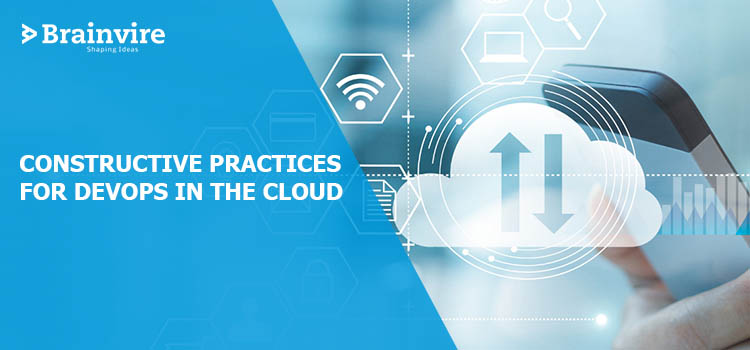
Cloud computing and DevOps are more like conjoined twins. The cloud offers automated assistance to provide application changes. DevOps on the other hand helps to align development based on user needs to quickly enter application production.
At times, IT experts who practice DevOps in the cloud make common errors that can be avoided easily. The main hurdle is that several professionals are unaware of the best practices with respect to DevOps in the cloud.
Often, the hurdle is considered to be the technology. However, the main concern is people and it is tricky to resolve their issues.
To resolve this issue, we have discussed certain constructive guidelines that can simplify the process of operating DevOps in the cloud-
Robust Security
Although you may have selected an identity-based security model for your business, security models keep on evolving in the cloud. This means you will need to make updated security solutions for DevOps tools and your business as well.
Security plays an integral role for your business for seamless integration and constant deployment process. Hire a chief security office who can monitor security within DevOps in the cloud.
Invest in Training
The mere implementation of the technology is not going to bring you results. It is equally important to accept the technology and make optimal use of it.
Train your team to understand and adapt to the new process. Along with other employees, the top-level management also needs to pay significant attention and willingly participate in the DevOps and cloud training process.
This will help them guide the team in the right direction and encourage departments to utilize the technology to simplify business operations.
Select DevOps Tools That Are Suitable for More Than One Cloud
There are a variety of DevOps tools that can be included for your business either on demand, on-premise, or on the large cloud platform. Several people prefer tools with the least resistance. These tools utilize public cloud providers to the fullest and are closely integrated with the application deployment platform.
Restricting yourself to a single cloud platform is not a wise move. Make sure that your applications are easily deployable on several different clouds. This will help you to select an ideal private or public cloud for your job. Limiting your choices can add restrictions to your business.
Run Automated Performance Tests
Often, application performance issues come under the radar when the application has either reached to the users or is at the production stage.
To avoid such circumstances, it is significant to run automated performance tests as they help examine functioning of the app and detect flaws in advance. These tests help you develop an efficient and well-performing application. Make sure that these tests are accurate, and blend well with the APIs and user interfaces.
Build a Governance Infrastructure
A sturdy governance infrastructure can help manage resources and services efficiently. Although these tools are diverse in terms of functionality and features, they promise improved management.
They help to track, manage, and secure resources and services and provide a roadmap to create policies, govern services, access the data, etc.
Investing Capital for DevOps in Cloud Transformation
Since they have saved a lot on their capital with DevOps and cloud, businesses believe they can utilize the same sum for transformation. This is a major misconception among enterprises and can lead to failure and poor business outcome.
Companies need to invest a significant amount to implement DevOps in the cloud. During the initial 2 years, they will have to make constant investments.
Post this phase, DevOps and cloud projects will start functioning independently. Moving forward, this technology will prove its worth with improved employee and overall business productivity.
Switch to Cloud Native Applications
Platform as a service and infrastructure as a service can help you reap benefits of the cloud platform. You can design applications that can easily be detangled from physical resources.
Regardless of whether applications are designed for the cloud or not, at times, the cloud can offer a virtual layer amid the application and other resources.
But, this is not workable!
Remember that decoupled architecture in the design has a relevant impact on the outcome. Almost 70% of improved efficiency is observed with development, deployment, and utilization of underlying cloud integration services.
In the long run, cloud computing productivity can bring monetary gains. Applications with smooth functioning are likely to make optimal use of resources. This means you are bound to save costs on resources. At the end of the month you will receive a cloud service bill with a lower sum.
Avoid Force Integration of Application in the Cloud
When planning for migration, businesses have hundreds of applications to migrate to the cloud.
However, it is important to follow certain norms and make wise choices-
- Traditional Technology: It is impossible to integrate or migrate applications based on traditional technologies to the cloud. So take a back-up and use the application on-premise if possible.
- Cost Involved: It is difficult to determine the migration cost of certain applications, both new and old. Some of them need add-on extensions to host them in the cloud.
- Prioritize Applications: Before you kick-start the migration process make sure to list down all applications based on their significance for your business. This will help you to migrate important applications first and eliminate unwanted applications.
- Examine: Analyze applications to calculate the amount of work required to meet the deadline. Make sure that you evaluate all factors from the start point to the end point for accurate analysis.
Wrapping Up
Enterprises are experiencing a new wave of the best DevOps practices with the help of professional cloud computing services. A team of seasoned professionals can assist businesses to make the most of the technology.
A significant amount of intellectual contribution is required to effectively use DevOps in the cloud.
Reach out to Brainvire’s expert brainpower to implement constructive practices for DevOps in the cloud today.
Related Articles
-
5 Benefits of Working with an AWS Partner Company
You might have often heard a discussion among your development team whether to hire an AWS partner for your next venture or not. Let’s find answers to this and start
-
How Azure DevOps Server Helps Your Business Grow
This is how Jamie Cool, Director of Program Management, Azure DevOps, defines the capabilities of Azure DevOps and Azure DevOps Server in a single statement. And being a Senior DevOps
-
How to make an Angular application more Accessible?
Angular is a popular, open-source front-end framework developed by Google to create dynamic, robust, and modern apps. It does not, however, always produce the most accessible apps. This article will



